Grant Rejection Letter
Dear [Applicant's Name],
Subject: Grant Application Rejection
I hope this letter finds you well. I am writing to inform you that your recent grant application to [Name of Grant Program/Organization] has been carefully reviewed and evaluated by our selection committee. While we appreciate your time, effort, and the merit of your proposal, I regret to inform you that your application has not been selected for funding at this time.
I understand that this news may be disappointing, especially after the considerable effort you put into developing your application. Please know that the selection process was highly competitive, and we received a large number of exceptional proposals. Unfortunately, due to limited funding and resources, we had to make difficult decisions, and we were unable to accommodate all the deserving projects.
Although your application was not successful on this occasion, I would like to emphasize that it does not reflect the quality or importance of your work. The decision-making process was rigorous, involving a thorough evaluation of various factors, including alignment with our funding priorities, the potential impact of the proposed project, and the availability of resources.
Please do not be discouraged by this outcome. Many outstanding proposals are not selected for funding during a particular grant cycle, but that does not diminish their significance or the potential for future success. I encourage you to explore other funding opportunities and consider reapplying to our program or seeking support from other organizations whose mission aligns closely with your project.
At [Name of Grant Program/Organization], we value your commitment to making a positive difference in your chosen field, and we appreciate the time and effort you invested in applying for our grant. While we cannot support your project at this time, we remain interested in your future endeavors. We strongly encourage you to stay connected with our organization and keep us informed of your progress and future projects.
Once again, I want to express our appreciation for your interest in our grant program. We wish you the best of luck in your future endeavors, and we hope that you will continue your valuable work, contributing to positive change in your community and beyond.
Thank you for your understanding and for considering our organization as a potential partner for your project.
Sincerely,
[Your Name]
[Your Title/Position]
[Your Organization]
Formal Grant Rejection Letter
Subject: Decision Regarding Your Grant Application
Dear [Applicant’s Name],
Thank you for submitting your application for the [Name of Grant] and for the time and effort you dedicated to preparing your proposal. After careful review by our committee, we regret to inform you that your application has not been selected for funding at this time.
This decision was reached after a highly competitive evaluation process. While your proposal demonstrated merit, we had limited resources and were unable to fund every project.
We encourage you to reapply in the next funding cycle and consider incorporating feedback provided in the review notes. We appreciate your commitment to [field/sector] and wish you continued success in your work.
Sincerely,
[Your Name]
[Your Title]
[Organization Name]
Quick Grant Rejection Email
Subject: Grant Application Result
Dear [Applicant’s Name],
We appreciate your interest in the [Name of Grant]. Unfortunately, your application has not been approved for funding.
Thank you for the effort and passion you put into your proposal. We hope you consider applying again in the future.
Best regards,
[Your Name]
Heartfelt Grant Rejection Letter
Subject: Outcome of Your Grant Application
Dear [Applicant’s Name],
We would like to sincerely thank you for applying for the [Name of Grant]. Your project demonstrates passion and a clear commitment to making a difference. After thorough consideration, we regret to inform you that your proposal was not selected for funding in this cycle.
Please understand that this decision is not a reflection of your dedication or the importance of your work. The number of applications far exceeded the resources available. We strongly encourage you to continue your efforts and reapply in the future.
We admire your dedication and wish you success in pursuing your goals.
Warm regards,
[Your Name]
[Organization Name]
Preliminary Grant Rejection Letter with Encouragement
Subject: Preliminary Results of Grant Application Review
Dear [Applicant’s Name],
Thank you for applying for the [Name of Grant]. While your application was not selected for funding in its current form, our reviewers recognized the potential of your project. We encourage you to revise and resubmit your proposal during the next funding round.
Detailed feedback will be shared with you to help strengthen your application. We are hopeful that with some refinements, your project will stand a stronger chance in the future.
We appreciate your commitment to [field/area] and look forward to your future submissions.
Sincerely,
[Your Name]
Official Grant Rejection Letter from Committee
Subject: Official Notification – Grant Application Status
Dear [Applicant’s Name],
On behalf of the [Name of Committee/Organization], I regret to inform you that your proposal for the [Name of Grant] has not been approved for funding. The selection process was rigorous, and we reviewed a large number of strong applications.
While your project was commendable, limited funds required us to make difficult decisions. You may request a summary of reviewer feedback to better understand areas for improvement.
We appreciate your interest and hope you will consider submitting a revised application in a future cycle.
Sincerely,
[Committee Chairperson]
[Organization Name]
Casual Grant Rejection Email
Subject: Grant Application Update
Hi [Applicant’s Name],
Thanks a lot for applying for the [Name of Grant]. After reviewing all the applications, we’re sorry to let you know that we weren’t able to select your proposal for funding this time around.
It was a tough decision, and we hope you’ll try again in the next round. Keep up the great work—you’re doing important things!
All the best,
[Your Name]
Detailed Grant Rejection Letter with Feedback
Subject: Feedback on Your Grant Application
Dear [Applicant’s Name],
We appreciate the time and effort you invested in your proposal for the [Name of Grant]. After a thorough review, we regret to inform you that your application has not been selected for funding.
The review panel found strength in your proposal’s [mention strengths, e.g., innovative approach, community focus], but noted areas needing improvement such as [list weaknesses, e.g., budget justification, sustainability planning]. We believe addressing these areas will significantly improve your chances in future submissions.
We encourage you to consider applying again and remain committed to supporting initiatives like yours. Thank you again for your interest.
Sincerely,
[Your Name]
Stern Grant Rejection Letter
Subject: Grant Application Result – [Name of Grant]
Dear [Applicant’s Name],
After a comprehensive review process, your application for the [Name of Grant] has not been selected for funding. Please note that this decision is final for the current funding cycle and cannot be appealed.
We acknowledge the effort put into your submission. However, given the limited funding and competitive nature of the process, only the highest-ranked proposals could be approved.
We thank you for your interest and wish you success in pursuing other funding opportunities.
Sincerely,
[Your Name]
What is a grant rejection letter and why do you need it?
A grant rejection letter is a formal communication sent to applicants whose proposals were not selected for funding. It serves several purposes:
- It provides closure to the applicant.
- It communicates professionalism and respect for the applicant’s efforts.
- It sometimes includes constructive feedback to help improve future applications.
- It maintains transparency in the funding process.
Who should send a grant rejection letter?
- Grant committees responsible for evaluating applications.
- Funding organizations, foundations, or government agencies.
- Administrators or directors authorized to issue decisions.
- Occasionally, individual reviewers may add comments that are compiled into the letter.
To whom should a grant rejection letter be addressed?
- The primary applicant or project leader who submitted the proposal.
- The organization or institution applying on behalf of a group.
- In collaborative projects, the lead contact named in the application.
When do you send a grant rejection letter?
- After the review and decision process is finalized.
- Once all applications have been considered and funding allocations are complete.
- Before any public announcement of awarded grants, so applicants are informed directly.
How to write and send a grant rejection letter?
- Use clear and respectful language.
- Start with gratitude for the application.
- State the rejection decision directly.
- Provide feedback when appropriate.
- End with encouragement to apply again or pursue other opportunities.
- Send via email for efficiency or formal letter for official correspondence.
Formatting guidelines for grant rejection letters
- Length: usually one page or less.
- Tone: professional, respectful, and clear.
- Wording: avoid harsh or overly negative phrasing.
- Mode: email for quick communication, printed letters for official contexts.
- Etiquette: respond promptly to respect the applicant’s time and effort.
Common mistakes to avoid when writing grant rejection letters
- Being vague and not giving clear feedback.
- Using overly harsh or dismissive language.
- Sending the letter too late, leaving applicants uncertain.
- Forgetting to personalize with the applicant’s name and project title.
Pros and cons of sending a grant rejection letter
Pros:
- Shows professionalism and respect.
- Helps applicants improve for the future.
- Maintains the organization’s reputation for fairness.
Cons:
- May discourage applicants if not worded carefully.
- Requires time and effort to draft personalized responses.
Tricks and tips for writing effective grant rejection letters
- Always begin with appreciation.
- Use neutral, non-judgmental language.
- Offer feedback if possible—it increases goodwill.
- Be concise but clear about the decision.
- Keep records of all correspondence for transparency.
Elements and structure of a grant rejection letter
- Subject line or heading.
- Greeting with applicant’s name.
- Acknowledgment of application.
- Direct statement of the rejection decision.
- Optional feedback or encouragement.
- Professional closing and signature.
After sending a grant rejection letter: what should you do?
- Keep records of all sent letters for accountability.
- Be ready to respond if the applicant requests feedback.
- Prepare templates for future cycles to ensure consistency.
- Maintain a positive relationship with applicants by encouraging reapplication.
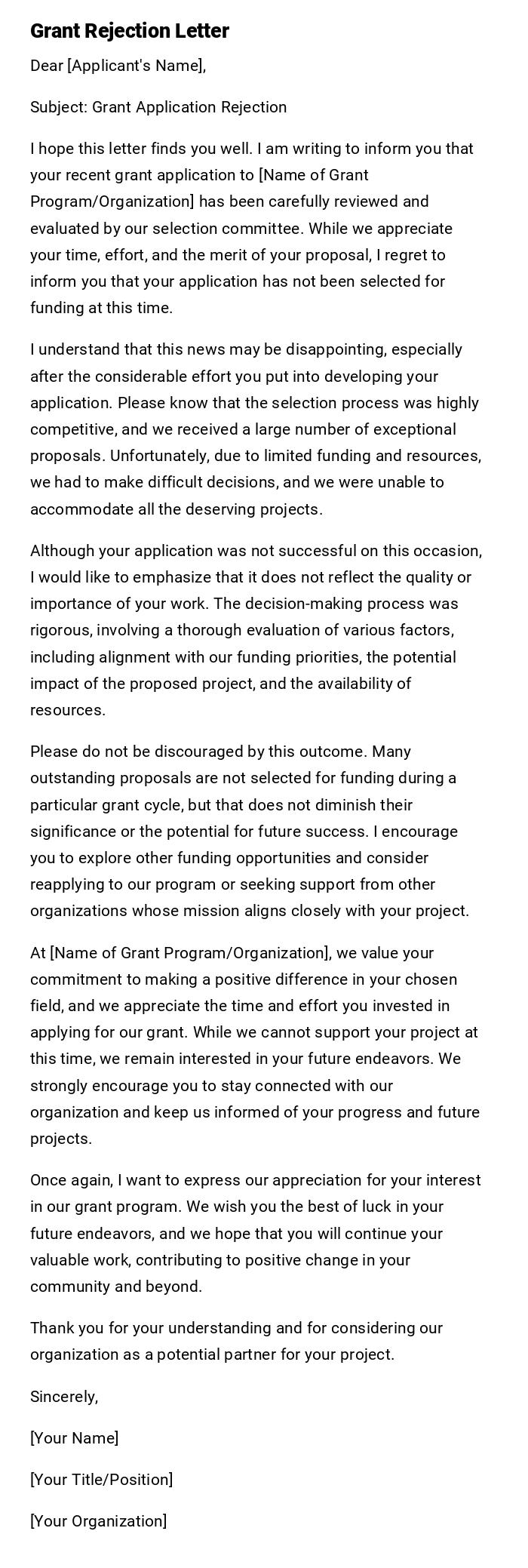
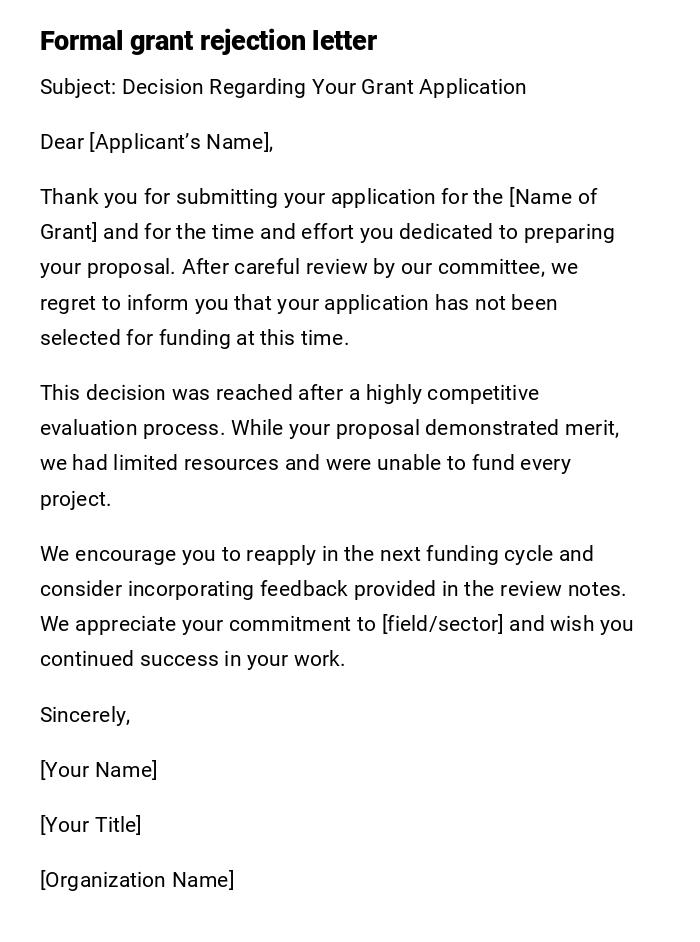
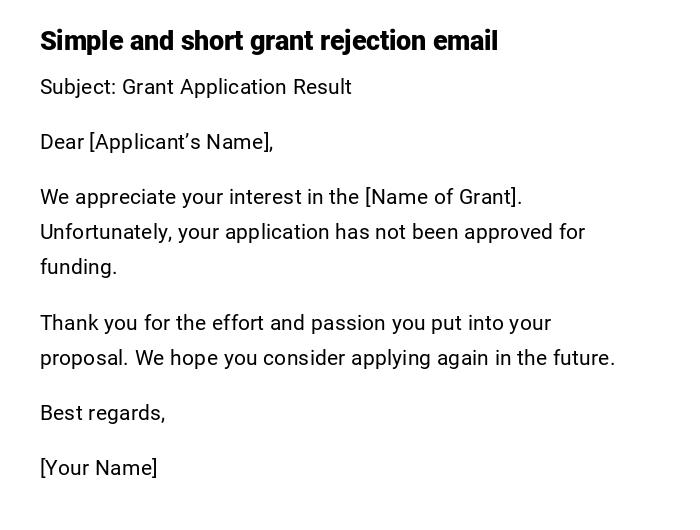
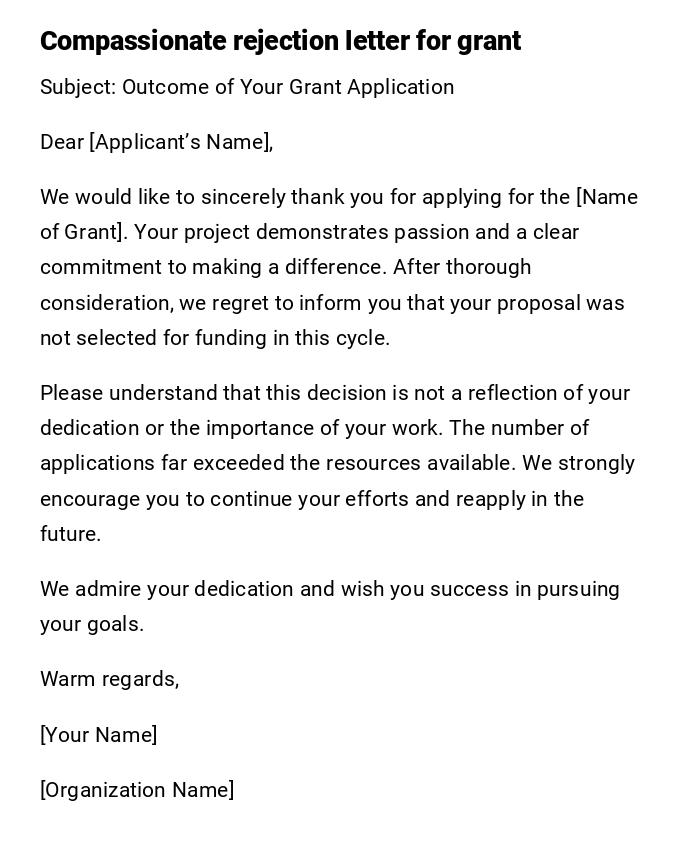
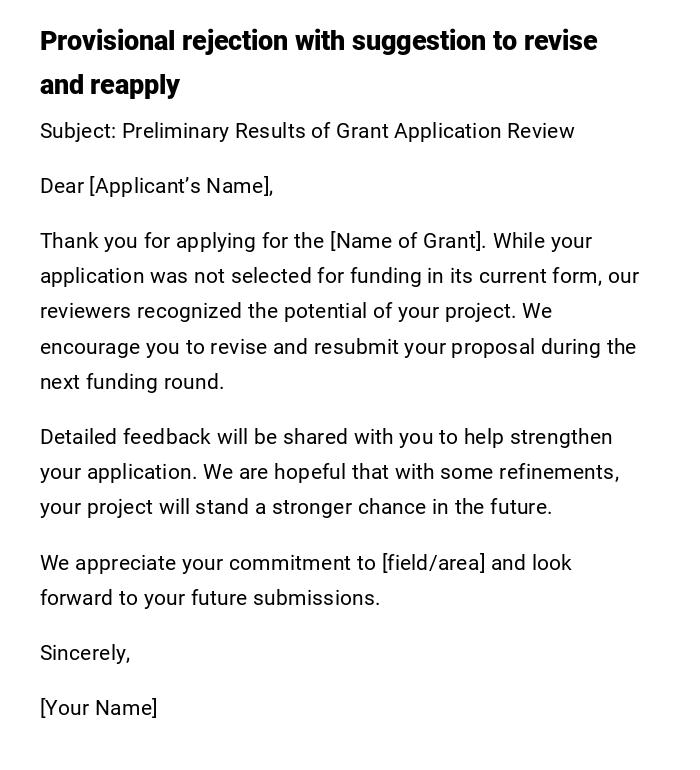
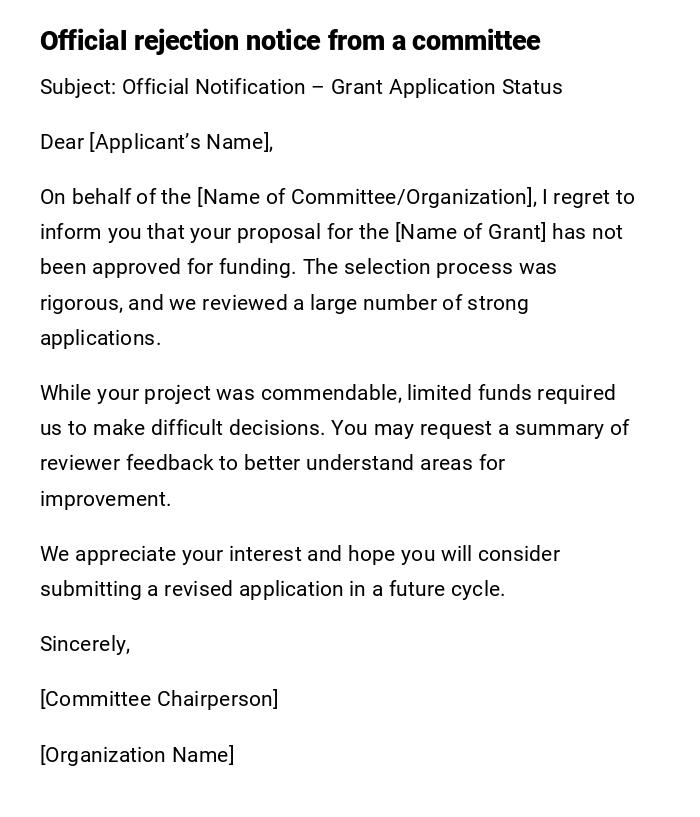
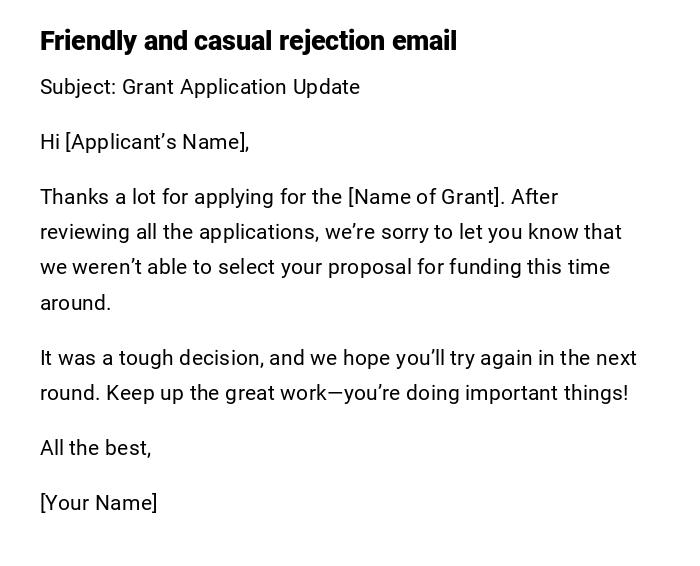
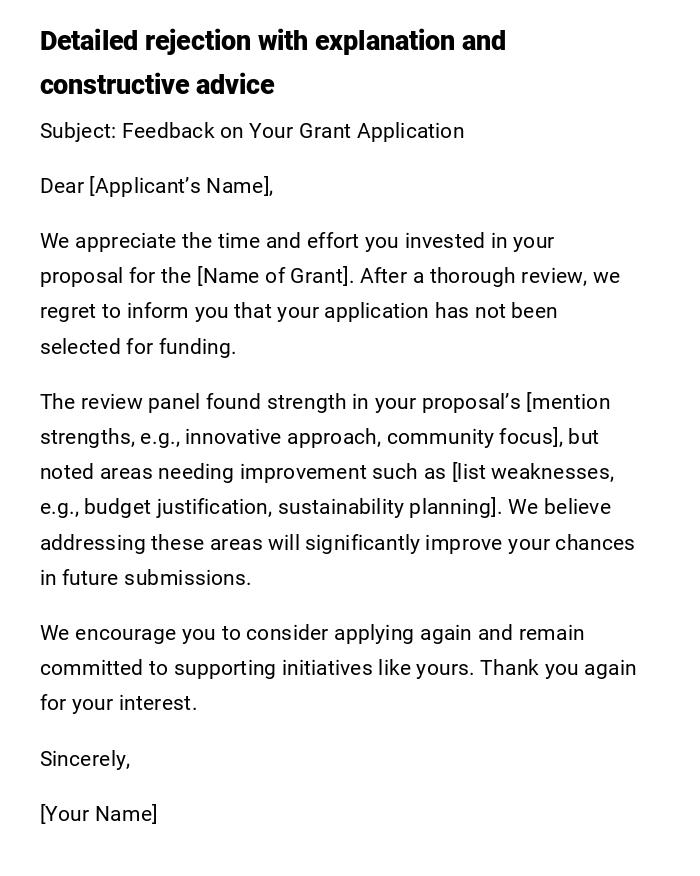
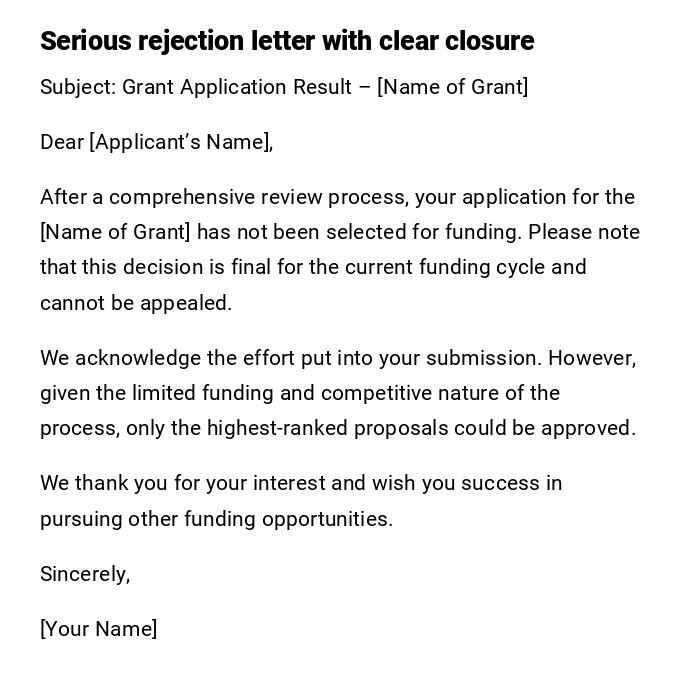

 Download Word Doc
Download Word Doc
 Download PDF
Download PDF